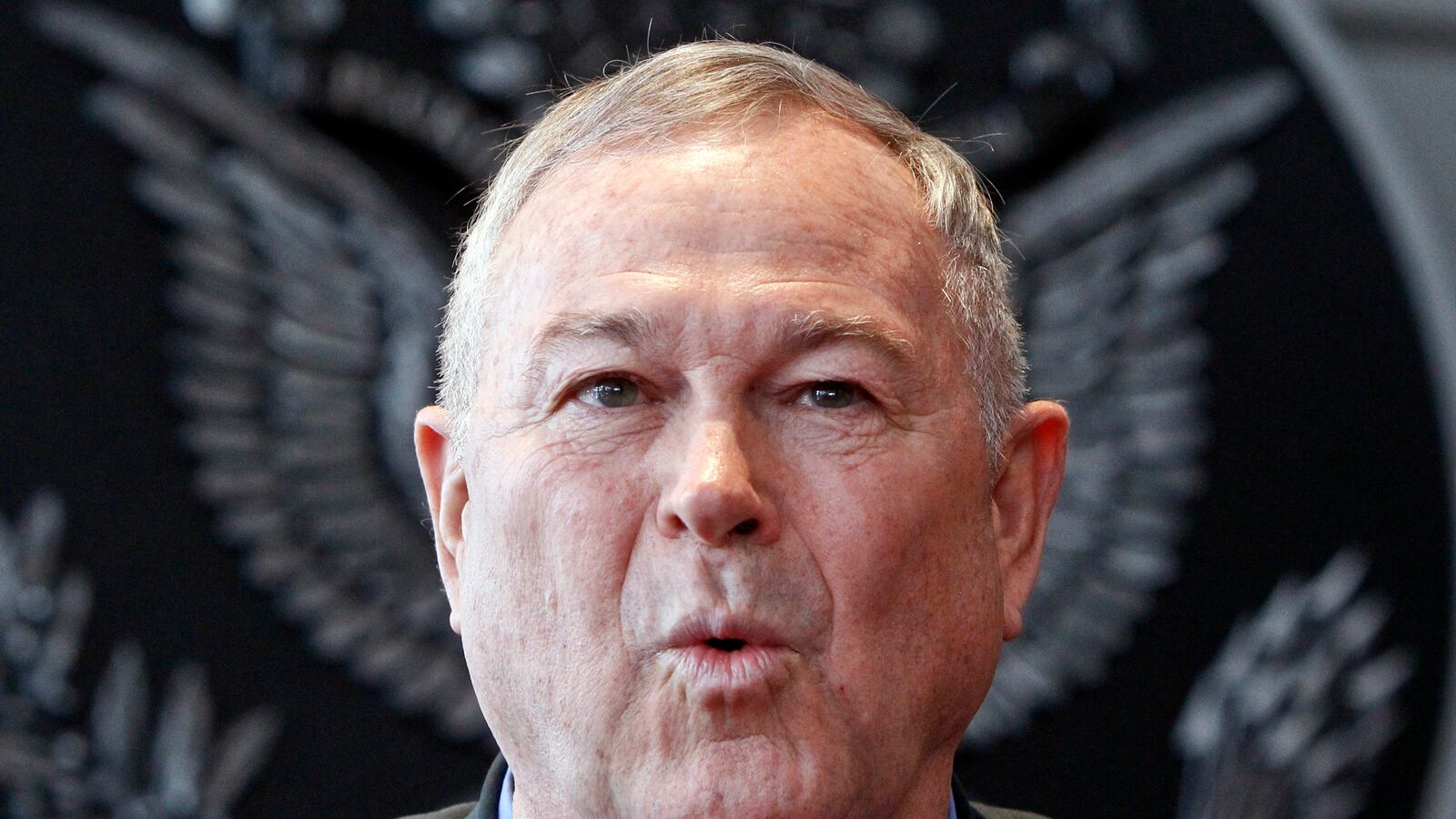Rep. Dana Rohrabacher had an odd warning last week for the Heartland Institute. The conservative think tank was hosting a conference challenging the notion of “whether man-made global warming is a problem worth addressing.” Rohrabacher, a prominent climate change skeptic who once suggested that “dinosaur flatulence” might have been responsible for past fluctuations in global temperatures, was delivering a speech entitled, “Global Warming as a Power Grab.”
Riffing on the notion of scientific consensus, the California Republican remarked that he did not “know whether fluoridating the water helps people’s teeth become better or not. But I do know that in this country, we should be the ones who should be deciding what we put into our bodies one way or the other. Not the federal government or the local government putting fluoride into our water!”
The last time water fluoridation was seriously debated in America was at the start of the Cold War. The far-right John Birch Society, whose founder claimed that Dwight Eisenhower was a “dedicated, conscious agent of the communist conspiracy,” launched a nationwide campaign opposing fluoridation on the grounds that it opened the floodgates to Soviet mind control experiments on Americans. Stanley Kubrick famously satirized the theory in his classic Dr. Strangelove via the character of Jack D. Ripper, the mad Air Force officer who warns against Soviet attempts to poison our “precious bodily fluids.”

In light of Rohrabacher’s repetition of Birch Society talking points, one might assume that he has maintained a rigorous skepticism, if not paranoia, about Russian designs on the world. Rohrabacher worked as a speechwriter for fellow Californian Ronald Reagan and, after winning his first term in Congress in 1988, traveled to the wilds of Afghanistan to join mujahadeen fighting the Soviets. “I was Vladimir Putin’s worst nightmare,” he boasted in an interview earlier this year. But in a befuddling foreign policy about-face, Rohrabacher is now Putin’s best friend on Capitol Hill.
When Russia invaded and annexed the Ukrainian peninsula of Crimea in March, Rohrabacher warned fellow conservatives against settling into a familiar foreign policy worldview. “The Cold War is over,” he said. “Putin is not Satan.”
That month, he was one of just 23 House members to vote against a $1 billion aid package to the wobbly Ukrainian government. The following week, he voted “present” on a resolution condemning Russia’s violation of Ukrainian sovereignty, a measure that earned the backing of 402 House members.
“Starting with our own American Revolution, groups of people have declared themselves, rightfully, to be under a different government or a government of their choosing,” Rohrabacher said, comparing the Russian-backed thugs who took control over the Crimean peninsula to America’s founding fathers. American sanctions on Russia, he said, were an “abomination of hypocrisy.”
Putin, Rohrabacher explained on Kremlin-funded propaganda channel RT in February, is “demonized” in the United States. It’s a familiar refrain for defenders of Russia’s actions, and Rohrbacher’s soft spot for Putin goes back to the early 1990’s, just a few years after he joined the Afghan insurgency that helped bleed the Soviet empire to death.
In an interview with a California talk radio station in September, the Congressman related how he met Putin when he visited Washington with a group of young Russian political leaders. Rorhrabacher, joined by future Dick Cheney aide Scooter Libby and “a bunch of my right wing friends,” challenged the Russians to a game of touch football.
After the scrimmage, the group headed to an Irish pub. Following a few drinks (the threat of Russians contaminating our “precious bodily fluids” no longer a worry), conversation turned to the question of “who won the Cold War.” To settle the matter, Putin and Rohrabacher engaged in an arm-wrestling match, which the future Russian president won handily.
“He’s a tough guy, and he’s supposed to be a tough guy. That’s what the Russian people want,” Rohrabacher said. “But that’s not a reason we shouldn’t try to work with him.”
To be sure, many a world leader were deceived by Putin early in his career, seeing a steady hand who could reassert authority after the chaotic leadership of his predecessor, Boris Yeltsin. Upon meeting Putin for the first time, former President George W. Bush infamously told reporters that he was “able to get a sense of his soul,” which was not that of a ruthless KGB officer embittered by the collapse of the Soviet Union, but rather “a man deeply committed to his country and the best interests of his country.”
For most people, Bush included, this positive impression of Putin was irrevocably altered by the 2008 invasion of Georgia, 20 percent of whose internationally recognized territory remains occupied by Russia to this day. But not Dana Rohrabacher.
“The Russians were right; we're wrong,” he declared at a hearing shortly after the war. “The Georgians started it; the Russians ended it.” Rohrabacher’s comments were repeated prominently in state-owned Russian news outlets. (Rohrabacher did not respond to requests to be interviewed for this article).
On Friday, in response to allegations that Russian-backed separatists in Ukraine shot down a commercial airliner, Rohrabacher did have some tough words for the Russian president. “It should be crystal clear to Putin that right now he needs to step forward and be part of revealing the truth effort and affixing responsibility to this tragic loss of life,” he told Buzzfeed. But even then, Rohrabacher hedged his criticism, likening Thursday’s tragedy to the US's downing of an Iranian civilian plane in 1988.
While he says he suspects pro-Russian forces were probably responsible, Rohrabacher is also “pretty well convinced” that the weapons used to destroy the aircraft were taken from the Ukrainian military, and not supplied by Russia itself (the Ukrainian government has denied that any such missiles capable of destroying a jetliner have fallen into rebel hands). And he seemed to echo Putin’s own claim yesterday that ultimate responsibility for the tragedy should lay at the feet of the Ukrainian government, which swept to power earlier this year after a revolution ousted former pro-Russian President Viktor Yanukovych. “Up until now I think most of criticism levied against Putin was unjustified. All of this stems from the fact that an elected leader of the Ukraine was driven from power by street violence.”
And yet, for all his outspoken defense of the Russian government, Rohrabacher has not received an ounce of gratitude from Moscow. “I kind of wish I would get some sort of word back,” he complained to the New York Times earlier this year.
Such talk perplexes Republican hawks. “His request to be thanked for his support proves he has never negotiated with the Russians, otherwise he would know they aren't moved by societal graces or moral imperatives,” Ric Grenell, a GOP strategist and one-time spokesman for former UN Ambassador John Bolton, told The Daily Beast.
Rohrabacher is not alone among American conservatives in expressing admiration for Putin. The socially retrograde paleoconervatives – who admire the Russian leader’s religiosity, homophobia and veneration for other “traditional values”—have emerged as some of his strongest defenders in the West.
Asked by the Times to explain his defense of Putin, Rohrabacher listed, among other questionable rationales, that “the churches are full.” A Pew study released earlier this year, however, found that less than one in ten Russians regularly attends church.
Without its communist ideology, Russia no longer unites America’s conservative camps in opposition. “You’ve got a much different Russia than it was under Communism, but you’ve got a lot of people who still can’t get over that Communism has fallen,” Rohrabacher has said.
“Dana has become increasingly quixotic through the years,” a GOP Hill source lamented to the Beast. “And he finds his most frequent congressional fellowship in the caucus of crazy. He hangs out with Louis Gohmert and Michelle Bachman and Steve Stockman,” three of the most extreme right-wing Republican House members.
This source points to Rohrabacher’s failed bid to win the chairmanship of the Science Committee, losing out to Lamar Smith of Texas, a Christian Scientist, as an indicator of his poor reputation among colleagues. “When they give the chairmanship of the Science Committee to a guy who doesn’t believe in taking medicine over Dana Rohrabacher, I think that says something.”






